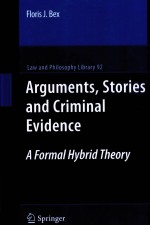
- 作 者:FLORIS J.BEX
- 出 版 社:SPRINGER
- 出版年份:2011
- ISBN:
- 标注页数:292 页
- PDF页数:302 页
请阅读订购服务说明与试读!
订购服务说明
1、本站所有的书默认都是PDF格式,该格式图书只能阅读和打印,不能再次编辑。
2、除分上下册或者多册的情况下,一般PDF页数一定要大于标注页数才建议下单购买。【本资源302 ≥292页】
图书下载及付费说明
1、所有的电子图书为PDF格式,支持电脑、手机、平板等各类电子设备阅读;可以任意拷贝文件到不同的阅读设备里进行阅读。
2、电子图书在提交订单后一般半小时内处理完成,最晚48小时内处理完成。(非工作日购买会延迟)
3、所有的电子图书都是原书直接扫描方式制作而成。
1 Introduction 1
1.1 Rational Theories of the Process of Proof 1
1.2 Making Sense of Evidence 4
1.3 Reasoning with Evidence in Artificial Intelligence and Law 5
1.4 Research Goals 7
1.5 Book Outline 9
2 Reasoning with Criminal Evidence 11
2.1 Facts, Evidence and General Knowledge 11
2.1.1 Facta Probanda and Facta Explananda 12
2.1.2 Evidence 13
2.1.3 General Knowledge and Generalizations 17
2.2 The Process of Proof: Discovery, Pursuit and Justification 20
2.2.1 Investigation, Trial and the Process of Proof 23
2.3 Reasoning in the Process of Proof 24
2.3.1 Abductive Reasoning and Inference to the Best Explanation 25
2.3.2 Causal Reasoning with Evidence 27
2.3.3 Reasoning About Motives and Actions 29
3 Two Approaches to Reasoning with Evidence: Arguments and Stories 33
3.1 Evidential Arguments 34
3.1.1 The Structure of Evidential Arguments 36
3.1.2 The Dialectical Nature of Argumentation:Attack and Defeat 41
3.1.3 Generalizations and General Knowledge in Evidential Reasoning 46
3.1.4 Summary and Evaluation 53
3.2 Stories 57
3.2.1 The Causal Structure of Stories 59
3.2.2 Episodic Structures and Story Schemes 63
3.2.3 Explaining the Evidence 69
3.2.4 Choosing the Best Explanatory Story for thc Evidence 73
3.2.5 Summary and Evaluation 77
4 A Hybrid Theory of Stories and Arguments 83
4.1 Combining Stories and Arguments 85
4.2 Evidential Support, Contradiction and Gaps 87
4.3 Story Coherence in the Hybrid Approach 89
4.3.1 The Plausibility and Consistency of a Story 90
4.3.2 The Completeness of a Story 92
4.4 Assessing and Comparing Stories 93
4.4.1 Comparing Stories 95
4.4.2 A Game for Inquiry Dialogue 98
4.5 Evaluation 100
A Formal Logical Hybrid Theory of Argumentation and Explanation 101
5.1 A Defeasible Logic 102
5.2 A Formal Theory for Argumentation 109
5.2.1 A Defeasible Logic for Evidential Arguments 109
5.2.2 Evidential Arguments 113
5.2.3 Attacking Arguments 116
5.2.4 Defeat and the Status of Arguments 118
5.3 A Formal Theory for Explanatory Stories 120
5.3.1 A Causal Theory for Explanations 120
5.3.2 Causal Stories 121
5.3.3 Stories as Explanations 123
5.3.4 Story Schemes 128
5.4 A Hybrid Theory of Argumentation and Explanation 132
5.4.1 Supporting and Contradicting Stories 133
5.4.2 The Coherence of Stories: Plausibility and Implausibility 136
5.4.3 The Coherence of Stories: Story Schemes and Completeness 138
5.4.4 Assessing and Comparing Stories 140
5.5 Dialogues About Proof 141
5.5.1 Framework for a Formal Dialogue Game 142
5.5.2 Players, Language and Moves 143
5.5.3 The Hybrid Theory in a Dialogue 145
5.5.4 Commitments 146
5.5.5 Comparing Explanations 147
5.5.6 Current Winner and Turntaking 149
5.5.7 The Protocol 151
5.6 An Example of the Dialogue Game 154
5.7 Evaluation 160
6 Case Study: Murder in Anjum 163
6.1 The Murder of Leo de Jager 164
6.1.1 Before the 24th: The Cannabis-Growing Operation and Bank Fraud 166
6.1.2 The Evidence in the Investigation into Leo's Death 167
6.2 An Analysis of the Case: Constructing Stories and Arguments 176
6.3 Cause of Death, Murder Weapon and Leo's State 178
6.3.1 The Murder Weapon 179
6.3.2 The Location Where Leo Died 186
6.3.3 Leo's Drugged State 188
6.3.4 Summary 189
6.3.5 Initial Evaluation 190
6.4 The Judiciary's View: Marjan Drugged and Killed Leo 193
6.4.1 Marjan's Motives for Drugging Leo 195
6.4.2 Marjan's Motives for Leo's Death 200
6.4.3 Leo's Death and the Events Afterwards 205
6.4.4 Summary of the Improved Judiciary's Story 213
6.5 Alternatives to the Judiciary's Story 215
6.5.1 Leo Took the Temazepam Himself 215
6.5.2 Beekman As the Killer 219
6.6 Comparing the Alternatives 224
6.7 Evaluation 225
7 Related Research on Reasoning with Criminal Evidence 229
7.1 Reasoning with Stories 230
7.1.1 Bennett and Feldman and Pennington and Hastie 230
7.1.2 The Anchored Narratives Theory 234
7.1.3 Evaluation 238
7.2 Wigmore and the New Evidence Theorists 240
7.2.1 Wigmore and the Science of Judicial Proof 240
7.2.2 Modified Wigmorean Analysis 244
7.2.3 Evaluation 248
7.3 Theoretical Models of Inference to the Best Explanation 250
7.3.1 Thagard's Explanatory Coherence 250
7.3.2 Josephson's Logical Model of Abduction 251
7.3.3 Evaluation 252
7.4 Keppens and Colleagues' Decision Support System for Police Investigation 254
7.4.1 Evaluation 255
7.5 Probabilistic Reasoning and Bayesian Belief Networks 256
7.5.1 Kadane and Schum's Analysis of the Sacco and Vanzetti Case 257
7.5.2 Bayesian Belief Networks and Sensitivity Analysis 259
7.5.3 Evaluation of Bayesian Approaches 262
8 Conclusions 265
8.1 Summary 265
8.2 Results 269
8.2.1 Reasoning with Criminal Evidence 269
8.2.2 Formal Theories of Defeasible Reasoning 272
8.3 Suggested Topics for Further Research 274
References 277
Name Index 285
Subject Index 289
